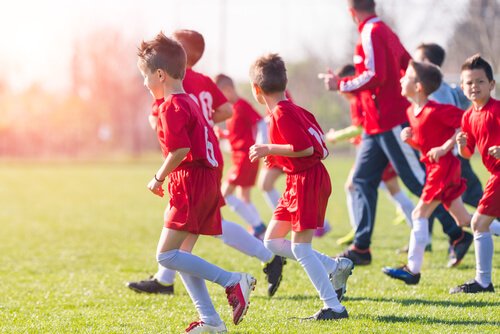How Switching Schools Affects Children

Switching schools involves a complex process of adaptation in which a child must face his fear of the unknown. He’ll most likely experience emotions of uncertainty or insecurity, which may lead him to feel helpless in the face of such a new situation.
If you’re planning to change your child’s school, consider first how switching schools may affect him or her.
Changes can lead to new opportunities for growth, but your child is going to need your help to adapt to his new environment.
The role of parents in the face of change
Changes are a normal part of life because they make us face our fears and doubts. Due to lack of experience, children don’t have the capacity to assess or calculate the situations they experience.
For this reason, parents should support and prepare them for facing the transition with confidence.
However, you must understand that every child will have his or her own way of expressing the bewilderment caused by this new circumstance. You have to be attentive to your child’s reaction.
In addition, parents must be willing to help and be companions. Parents represent stability for their children, so they are the ones who can help them better adjust to change.
How does switching schools affect children?
As a mother, you’ve experienced different types of changes throughout your life. These changes include employment, friendships, homes and even new doctors. In this sense, you’re aware that changes do affect children and cause them to suffer.

It’s not easy for children to go through a period of instability. They can experience a range of emotions, such as nostalgia, anger, frustration, fear, pessimism, sadness, grief and joy.
Among the changes they will face are:
- Making new friends and distancing themselves a bit from old ones.
- Adapting to other teachers and possibly new study methods.
- Engaging in unfamiliar surroundings or a new climate.
- Being the center of attention due to being the new kid in class.
- Using a different means of transportation and getting used to different routes.
Some children may be very resistant to change, while others may seem positive, flexible and very adaptable. The more drastic the change, the more resistant the child could become.
Of course, we can’t accurately measure the degree of impact that switching schools has on every child. There are several factors that come into play, such as what the child is leaving behind, and what he’ll find at his new school.
However, if the child manages to make new friends quickly, the changes are likely to be more bearable. Keep in mind that your child’s academic performance may decline at first during this transition.
“Changes can lead to new opportunities for growth – it all depends on one’s attitude.”
How to reduce the effects of switching schools?
Here are some recommendations you can follow to help your child face this change:
Communication and sincerity
When you know that the decision to change schools is irreversible, you must tell your child as soon as possible. Talk to him openly and give him the opportunity to express his concerns and insecurities. Remember that he may be reticent and negative.
Don’t lie to him by making him believe that you’ll protect him from the effects of change. Sooner or later, he’ll realize that he does have to face them.
Help him see the change positively
Switching schools will give your child a chance to start over and make new friends. Help him enjoy the change instead of suffer from it.
Visit the school first
By visiting the school first, your child won’t feel lost when he attends classes. Take a tour of the facilities. If possible, show your child his new classroom, the library, the cafeteria, and the gym.
Prepare your child for the first day of school
Preparation is your best option. The more you inform your child, the better it will be for both of you. Explain what time school starts and finishes, who his teachers will be, etc.

Sign your child up for extracurricular activities
A quick way to integrate your child with other classmates outside school hours is to have him participate in extracurricular activities. Invite him to sign up for a sports team he likes, such as football, basketball or volleyball. If he likes art, you can enroll him in music, painting or acting classes.
Finally, you must have patience and give your child time to adapt to the change. This will make your child experience different things for himself and contribute to his maturity.
If you respect his space and give him confidence in his new circumstances, you’ll help reinforce his self-esteem and security. Thus, switching schools will be a positive experience.
All cited sources were thoroughly reviewed by our team to ensure their quality, reliability, currency, and validity. The bibliography of this article was considered reliable and of academic or scientific accuracy.
- Balick, A. (2014). Top ten tips for students changing schools. The Guardian. Recuperado de: https://www.theguardian.com/childrens-books-site/2014/aug/19/top-10-tips-changing-schools-students-parents
This text is provided for informational purposes only and does not replace consultation with a professional. If in doubt, consult your specialist.








